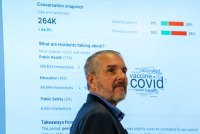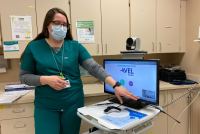Latest KFF Health News Stories
Many Families With Unaffordable Employer Coverage Now Eligible for Covered California Subsidies
If family coverage on an employer-sponsored plan is too expensive, a worker’s spouse and dependents may be eligible for Affordable Care Act subsidies under a new federal rule.
Public Health Agencies Try to Restore Trust as They Fight Misinformation
As public health departments work on improving their message, the skepticism and mistrust often reserved for covid-19 vaccines now threaten other public health priorities, including flu shots and childhood vaccines.
Siete preguntas que una persona mayor debe hacer antes de someterse a una cirugía compleja
En muchos casos, la cirugía puede salvar la vida del paciente o mejorar su calidad de vida. Pero la edad avanzada los expone a un mayor riesgo de resultados no deseados, como dificultades en las actividades cotidianas, hospitalizaciones prolongadas, problemas de movilidad y pérdida de independencia.
Nueva herramienta ayudaría a comparar costos de hasta 500 servicios médicos
Desde el 1 de enero, las aseguradoras y los empleadores que ofrecen planes de salud deben proporcionar calculadoras en línea para que los pacientes obtengan estimaciones detalladas de lo que deberán por una variedad de servicios y medicamentos, teniendo en cuenta sus deducibles y copagos.
Want a Clue on Health Care Costs in Advance? New Tools Take a Crack at It
Another effort to make upfront cost comparisons possible in an industry known for its opaqueness: an online tool for consumers to get some idea of what they may pay for medical care.
Weighing Risks of a Major Surgery: 7 Questions Older Americans Should Ask Their Surgeon
How do older adults know when the potential benefits from surgery are worth the risks? And what questions should they ask as they try to figure this out? Our columnist asks experts for guidance.
Telehealth Brings Expert Sexual Assault Exams to Rural Patients
Some rural residents must travel hours for a sexual assault exam. Specialized telehealth services are expanding so they can obtain care closer to home.
‘An Arm and a Leg’: The Year in Review, From Prenatal Testing to Insulin Pricing
The editorial team of “An Arm and a Leg” looks back on the reporting that hit close to home over the past year, including insulin pricing and prenatal testing.
Seasonal Cooks’ Secret Sauce: Heaping Nutrition and Cultural Zest
Two “nutrition ambassadors” from Oldways, an organization that makes tradition and pride centerpiece ingredients in food education, invite KHN into their kitchens for a peek at A Taste of African Heritage dishes to accompany holiday celebrations.
Journalists Recap Coverage of Gun Violence, Drug Imports, and Mental Health
KHN and California Healthline staff made the rounds on national and local media this week to discuss their stories. Here’s a collection of their appearances.
Survivors of Gangs and Gun Violence, These Women Now Help Others Navigate Grief
As teens, these three women lived amid street gangs around East St Louis, Illinois. Now, as adults, they support the families who have lost loved ones to gun violence. And because of their past, some residents trust them more than they do the police.
Colorado Considers Changing Its Red Flag Law After Mass Shooting at Nightclub
In El Paso County, where five people were killed in a mass shooting at a nightclub in November, officials have filed relatively few emergency petitions to temporarily remove a person’s guns, with scant approvals.
KHN-NPR’s ‘Bill of the Month’ at 5: A Treasury of Solutions for Confounding Medical Bills
Readers and listeners shared more than 1,000 personal stories of medical billing problems with KHN-NPR’s “Bill of the Month” investigative series this year, helping us illuminate the financial decisions patients are pressed to make in their most vulnerable moments.
KHN’s ‘What the Health?’: The Covid Response Coordinator Speaks
In this special episode of KHN’s “What the Health?” Dr. Ashish Jha, the White House coronavirus response coordinator, talks with host Julie Rovner, KHN’s chief Washington correspondent, about where we are in the pandemic and how we should transition out of the public health emergency. This episode was taped on Dec. 20.
Inmigrantes detenidos en centros enfrentan riesgo de covid como al inicio de la pandemia
Para las aproximadamente 30,000 personas que viven en espacios cerrados en la red de instalaciones de detención de inmigrantes del país, covid sigue siendo una amenaza constante.
Centene, Under Siege in America, Moved Into Britain’s National Health Service
A nine-minute public hearing gave the U.S. insurance giant a foothold in Britain’s prized National Health Service. One doctor called it “privatization of NHS by stealth.” And critics worry that business efficiencies will degrade the quality of care.
‘An Arm and a Leg’: Getting Insurance to Pay for Oral Surgery Is Like Pulling Teeth
A car crash left a woman in need of oral surgery, but her health insurance wouldn’t cover it. Her ongoing fight shows podcast host Dan Weissmann the weird way insurance treats teeth and reveals a big problem in the Obamacare marketplace.
ER Doctors Call Private Equity Staffing Practices Illegal and Seek to Ban Them
Doctors, consumer advocates, and some lawmakers are looking forward to a California lawsuit against private equity-backed Envision Healthcare. The case is part of a multistate effort to enforce rules banning corporate ownership of physician practices.
‘Caged … For No Fault of Your Own’: Detainees Dread Covid While Awaiting Immigration Hearings
Covid remains a threat for the roughly 30,000 people in the country’s network of immigration facilities. But ICE continues to flout its own pandemic protocols, an extension of the facilities’ poor history of medical care.
Hundreds of Hospitals Sue Patients or Threaten Their Credit, a KHN Investigation Finds. Does Yours?
An examination of billing policies and practices at more than 500 hospitals across the country shows widespread reliance on aggressive collection tactics.






















